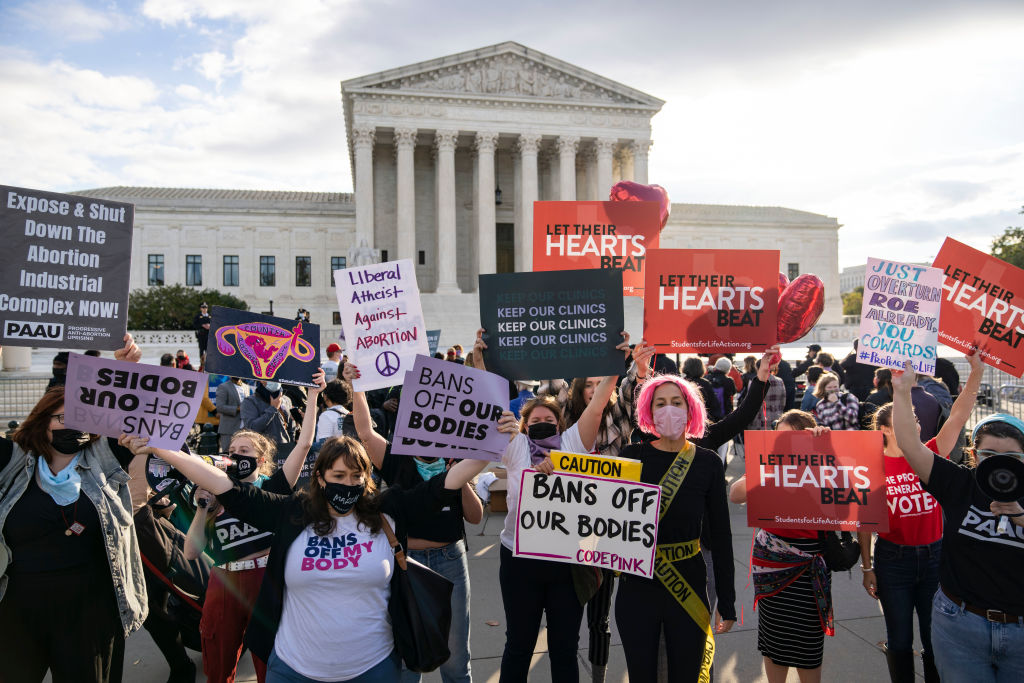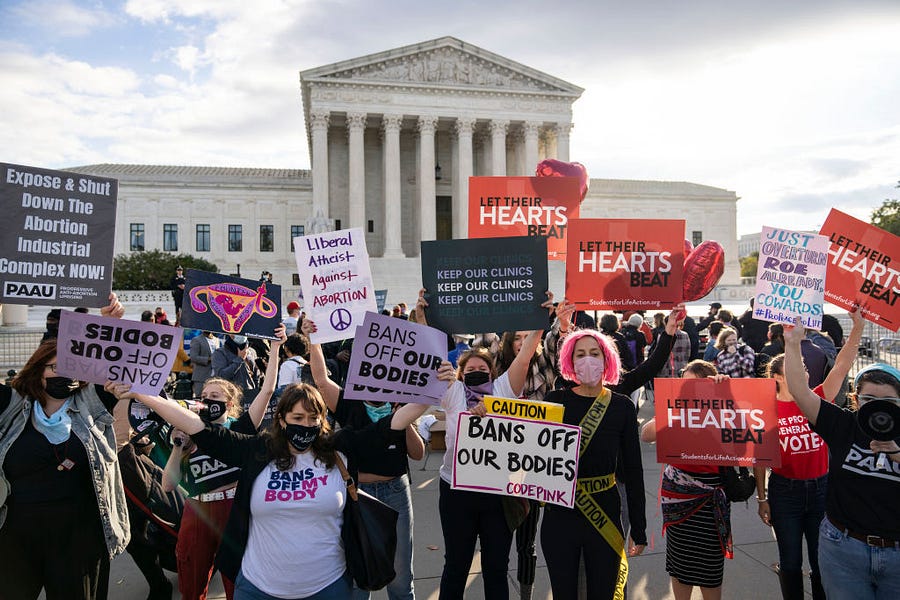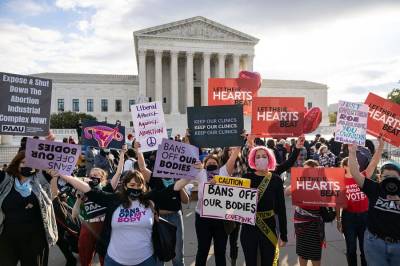Happy Tuesday! Today’s the day we find out who wins the Virginia gubernatorial race, which in turn will determine the size of Democrats’ spending bills, the outcome of the 2022 midterms, the 2024 presidential nominees, whether we go to war with China, and the survival of the human race as we know it. No pressure!
Quick Hits: Today’s Top Stories
In a report published over the weekend, the Centers for Diseases Control concluded that available evidence shows both fully vaccinated individuals and those previously infected with COVID-19 have a “low risk” of additional infection for at least six months, but that “substantial immunologic evidence” indicates that vaccination following infection “significantly enhances protection and further reduces risk of reinfection.”
Ethiopian Prime Minister Abiy Ahmed has encouraged Ethiopian citizens to “join the fight” against the rebel Tigray People’s Liberation Front (TPLF) in recent days amid reports that TPLF forces killed more than 100 youths while capturing the city of Kombolcha. A TPLF leader denied the allegation.
The Supreme Court on Monday sent back a case brought by the Roman Catholic Diocese of Albany challenging a New York mandate that health insurance policies cover abortions, asking the lower court to reconsider their earlier ruling in light of June’s Fulton v. Philadelphia decision, which allowed a Catholic foster care organization to continue operating. The court also declined to hear Dignity Health v. Minton, a case brought by a Catholic hospital that was sued after refusing to perform a hysterectomy on a transgender man.
New York City’s COVID-19 vaccine mandate for public workers went into effect on Monday, with 91 percent of the city’s workforce of approximately 378,000 having received at least one vaccine dose. The city has placed about 9,000 unvaccinated workers—a disproportionate number of whom are first responders—on unpaid leave, and another 12,000 or so are continuing to work while decisions regarding their religious or medical exemptions are made.
Texas’ Abortion Law Faces Supreme Court Scrutiny

Two months ago yesterday, the Supreme Court ignited a firestorm across the country by—quite literally—doing nothing. A Texas law prohibiting abortions in the state after six weeks went into effect on September 1, and—despite the legislation almost assuredly running afoul of Planned Parenthood v. Casey’s* “undue burden” test—the Supreme Court opted not to step in to block its enforcement.
About 24 hours, later, Justice Samuel Alito explained why: Senate Bill 8’s (SB8) enforcement is not in the hands of state officials like prosecutors or county clerks, but private citizens who can collect $10,000 and attorney’s fees for successfully suing anyone who performs—or “knowingly engages in conduct that aids or abets the performance” of—an abortion after a fetal heartbeat is detected. Noting that there were “serious questions” about law’s constitutionality, a majority of the court nonetheless voted to deny an application for injunctive relief. Texas legislators had, through what Cato Institute Vice President Ilya Shapiro labeled “a clever gimmick,” essentially hacked the system of federal court review.
“Federal courts enjoy the power to enjoin individuals tasked with enforcing laws, not the laws themselves,” Alito wrote. “And it is unclear whether the named defendants in this lawsuit can or will seek to enforce the Texas law against the applicants in a manner that might permit our intervention.”
Two months later—after a September in which the number of abortions performed in Texas was reportedly down 50 percent year-over-year—the issue reached the Supreme Court again, with justices hearing oral arguments Monday in two cases that have sprung up in response to the law: Whole Woman’s Health v. Jackson and United States v. Texas. Abortion came up plenty in the combined three hours of deliberation, but it isn’t at the heart of either case.
“Both the U.S. v. Texas and Whole Woman’s Health v. Jackson, they’re purely about the procedural question of whether these entities can sue before any enforcement action has been taken,” Ilya Somin, a constitutional law professor at George Mason University, told The Dispatch. “It’s not about the substantive question about whether Roe v. Wade should be overruled. And that’s why you see people—some of whom would probably be perfectly happy if Roe v. Wade were limited or overruled—still worried that allowing SB8 to evade judicial review would set a dangerous precedent.”
Solicitor General Elizabeth Prelogar—confirmed to her post last Thursday—laid out how she viewed the stakes while arguing the Biden administration’s case. “The United States does not lightly invoke an authority like this to sue a state,” she said in response to a question from Justice Brett Kavanaugh. “The reason we’ve done it here is because SB8 is so unprecedented, extraordinary, and extraordinarily dangerous for our constitutional structure.”
“If Texas is correct that it can nullify this court’s precedents and it can successfully evade the mechanisms that this Court recognized in Ex parte Young,” she continued, referring to a 1908 Supreme Court ruling establishing that individuals can sue state officials to prevent them from enforcing unconstitutional laws, “then no constitutional right is safe.”
Kavanaugh expressed similar concerns in his questioning of Texas Solicitor General Judd Stone, who was tasked Monday with defending his state’s creative legal maneuvering. “Are you saying, absent [Congressional action], that Second Amendment rights, free exercise of religion rights, free speech rights, could be targeted by other states?” Kavanaugh asked, referencing a hypothetical laid out by Chief Justice John Roberts in which a state passed a law making anyone who sells an AR-15 liable for $1 million to any citizen that sued them. “Would that kind of law be exempt from pre-enforcement review in federal court?”
After arguing that Congress could theoretically step in to alleviate some of these issues—something Kavanaugh noted would be “quite difficult” to do in today’s polarized environment—Stone conceded that it would.
The court’s more conservative justices questioned who would actually be enjoined in providing injunctive relief. “It’s unprecedented and it is contrary to our system of federalism to enjoin a state judge even from hearing a case,” Alito told Prelogar, noting that the court’s ruling would supply precedent for a whole host of future cases, not just this particularly unusual one. “How can you enjoin a judge from performing a lawful act, which is the adjudication of a case that is filed before the judge?”
Justice Neil Gorsuch, meanwhile, questioned Prelogar over whether it’s possible to enjoin individual plaintiffs filing suits under SB8 if they cannot then be held in criminal contempt. “Is this [just] an advisory opinion saying, ‘Don’t file these things, we will throw them away, but we have no contempt power to enforce the injunction?’” he asked.
You can’t always deduce a justice’s eventual decision in a case from their behavior during oral arguments, but most seasoned Supreme Court prognosticators believe that Kavanaugh and Justice Amy Coney Barrett’s respective lines of questioning—alongside Roberts’ September dissent and the liberal justices’ declared opposition to SB8—will result in Texas abortion providers prevailing when the court issues a ruling, expected within a few weeks.
“There could well be at least six justices, maybe even seven, who are inclined to let the private litigants proceed,” Somin told The Dispatch, referring to the eventual ruling in Whole Woman’s Health.
The outcome of the Justice Department’s suit, however, is far murkier, because—as Sarah points out on today’s episode of Advisory Opinions—it’s not entirely clear the United States has standing upon which to sue the state of Texas. “Interestingly, having an injury is not enough,” she said. “You also need a cause of action. What are you suing under? The ‘U.S.’ does not have a constitutional right to an abortion, so you are not suing under the Constitution. And there’s no statute by Congress that says the U.S. has a right to sue the state of Texas when they are mean.”
“The idea of the federal government just having plenary authority to sue over any state law at any time, I can’t imagine that's going to be the eventual rule,” Shapiro said.
But a favorable decision in Whole Woman’s Health would likely be enough for abortion providers to tie up SB8 in court like any other state’s heartbeat bill. At that point, all pro-life and pro-choice attention can then turn to Dobbs v. Jackson Women’s Health Organization, which is positioned as a much more direct shot at overturning Roe v. Wade. Oral arguments are set for December 1.
A Look at Today’s Less Exciting Elections
Well, that’s not a headline designed to keep you reading, is it?
As millions of Americans go to the polls in off-year elections today, all eyes are understandably on Virginia’s gubernatorial race: It features a well-known figure in Terry McAuliffe, it’s taking place in the national media’s backyard, and by all accounts it’s more or less in a dead heat. Whoever wins, we’re going to break the campaign down every which way: In TMD and The Sweep, on The Dispatch Podcast, and Advisory Opinions. You can probably count on a G-File, French Press, and/or Chris Stirewalt column touching on the outcome as well.
We say all that to let you know we’re going to ignore Virginia entirely this morning and focus on a couple of other elections taking place today: New Jersey’s gubernatorial race and two special elections in Ohio. None of them are as close as McAuliffe vs. Youngkin—and they don’t carry with them the same narrative oomph—but we’ll catch you up quickly.
Ousting Murphy in New Jersey? Fuhgeddaboudit.
Incumbent New Jersey Gov. Phil Murphy is widely expected to become the first Democratic gubernatorial candidate to win a second term in his state since Brendan Byrne in 1977.
Murphy has managed to maintain a steady polling lead over GOP challenger and former state legislator Jack Ciattarelli even as President Joe Biden’s popularity has fallen in the state and COVID-19—the issue around which Murphy has centered his campaign—has faded in importance to New Jersey voters. A Monmouth poll of likely voters last week showed Murphy with a 51-40 percent lead over Ciattarelli. Only 43 percent of those likely New Jersey voters surveyed said they approve of Biden.
Like McAuliffe in Virginia, Murphy has invested quite a bit of energy tying his Republican opponent to former President Donald Trump, who lost New Jersey by nearly 16 points in 2020. “Stop the Trump Team. Vote Murphy.” signs are plastered everywhere in New Jersey, and Murphy has been running ads reminding voters of Ciattarelli’s attendance at a November 2020 “Stop the Steal” rally. (Since winning the Republican nomination, Ciattarelli has denied knowing it was a “Stop the Steal” rally and declared Biden the legitimately elected president.) The Trump-centric strategy may backfire for Democrats in Virginia, but it’s unlikely to fail in New Jersey.
“It kind of works in a different way [in New Jersey] because there is such a big Democratic registration advantage there,” a GOP strategist told The Dispatch, noting there are approximately 1 million more registered Democrats than Republicans in the Garden State.
If Ciattarelli manages to pull off the upset, it’ll likely be due to his stance on lowering property and corporate taxes in the state, which was listed as New Jersey voters’ top priority in a recent poll—followed closely by “jobs and the economy.” The pandemic has fallen more or less to the wayside for New Jerseyans in recent months, from 41 percent listing it as their No. 1e issue back in August to just 15 percent today.
Murphy has implemented one of the strictest COVID-19 strategies in the country over the past 18 months, and New Jersey’s pandemic death rate is middle of the pack despite the state being hit badly by the first wave. Nearly twice as many voters in the state trust the Democrat to handle the pandemic than the Republican.
“There just really doesn't seem to have been a major misstep by Murphy that Ciattarelli could take advantage of,” said Jessica Taylor—Senate and governors editor for the non-partisan Cook Political Report.
OH-IO
Ohio also has two special elections today, neither of which is expected to be that close. But one has garnered Biden’s attention in the closing hours of the campaign, giving some optimism-starved Democrats the slightest hope of turning a historically red district blue.
Let’s start with a quick stop in this Morning Dispatcher’s second favorite city on the planet: Cleveland.
Democratic Rep. Marcia Fudge occupied Ohio’s 11th Congressional District seat for more than a decade before being tapped by Biden to serve as housing and urban development secretary. Her resignation created a seat opening for the first time since 2008, and Cuyahoga County Council member Shontel Brown beat out former Bernie Sanders surrogate Nina Turner in a contentious Democratic primary. Brown will almost certainly beat GOP nominee Laverne Gore tomorrow, as the 11th District hasn’t elected a Republican since the early 1980s.
Ohio’s 15th Congressional District, meanwhile, opened up after GOP Rep. Steve Stivers announced his resignation from Congress in May to lead Ohio’s Chamber of Commerce. Stivers had held the seat since 2010, and Democrats have controlled the district for only two years dating back to the 1960s. Still, Democrats are hoping moderate State Rep. Allison Russo can pull off a surprise victory in the region Trump won by 14 percent last year.
But it’s unlikely, despite Biden’s endorsement of Russo on Monday. The Republican running to replace Stivers—National Guard veteran and coal lobbyist Mike Carey—won a crowded GOP primary after receiving Trump’s endorsement. Last week, he campaigned with former Vice President Mike Pence. Carey has leaned particularly hard into the Trumpified Republican Party. On his campaign website under the “Meet Mike” section are four phrases: Pro-Trump, America First, Outsider, and Ready to Fight.
Worth Your Time
Diet-related diseases like obesity, hypertension, and diabetes are among the biggest risk factors for severe COVID-19, and the linkage has led countries around the world to reprioritize public health messaging on healthy eating and, in some cases, outright ban junk food sales to children. There has been no such reckoning in the United States, Helena Bottemiller Evich notes in a piece for Politico. “As the link between poor diets and the toll of Covid-19 became clear, some food industry leaders began bracing for a backlash, assuming that top government officials would be looking to take action in the aftermath of the pandemic,” she writes. “[But] there is no national strategy. There is no systemswide approach, even as researchers increasingly recognize that obesity is a disease that is driven not by lack of willpower, but a modern society and food system that’s almost perfectly designed to encourage the overeating of empty calories, along with more stress, less sleep and less daily exercise, setting millions on a path to poor health outcomes that is extremely difficult to break from.”
In her latest New York Times newsletter, Jane Coaston compares sports fandom to political polarization. “My hatred for Michigan State is not sensible,” she writes. “I did not come to it through logical decision making and a firm comprehension of the facts. My hate for Michigan State developed just as my love for Michigan did, naturally, easily, through a change of cities and the formation of lifelong friendships. And my politics are likely very much the same. I am proud of my willingness to be wrong, but I’ve noticed that I have a troubling propensity to excuse my own wrongness in the face of evidence by saying that hey, well, those guys are probably even more wrong than I am. That’s not reason. That’s fandom.”
Presented Without Comment
Also Presented Without Comment
Toeing the Company Line
For more on the Supreme Court’s reactions to SB 8, check out Monday’s episode of Advisory Opinions! Sarah runs through what she sees as the potential outcomes of the various cases, while David explains why the litigation “alarms” him. Plus, qualified immunity, Catholics and abortion, vaccine mandates, and some Halloween costume updates.
On the site today, Anthony Ruggiero and Andrea Stricker of the Foundation for the Defense of Democracies look back on the legacy of A.Q. Khan, the Pakistani nuclear engineer who operated the world’s most prolific black market nuclear proliferation network.
Also, Emma Rogers explains the evolution of the U.S.’s use of drone warfare since the Bush administration first deployed drones to conduct targeted killings after 9/11.
Let Us Know
Which precedent concerns you more: States finding ways to evade judicial review of potentially unconstitutional laws, or the federal government enjoining state judges from even hearing a case?
Reporting by Declan Garvey (@declanpgarvey), Andrew Egger (@EggerDC), Charlotte Lawson (@lawsonreports), Audrey Fahlberg (@AudreyFahlberg), Ryan Brown (@RyanP_Brown), Harvest Prude (@HarvestPrude), and Steve Hayes (@stephenfhayes).
Correction, November 2, 2021: The “undue burden” test referenced above datess back to Planned Parenthood v. Casey, not Roe v. Wade.






Please note that we at The Dispatch hold ourselves, our work, and our commenters to a higher standard than other places on the internet. We welcome comments that foster genuine debate or discussion—including comments critical of us or our work—but responses that include ad hominem attacks on fellow Dispatch members or are intended to stoke fear and anger may be moderated.
With your membership, you only have the ability to comment on The Morning Dispatch articles. Consider upgrading to join the conversation everywhere.